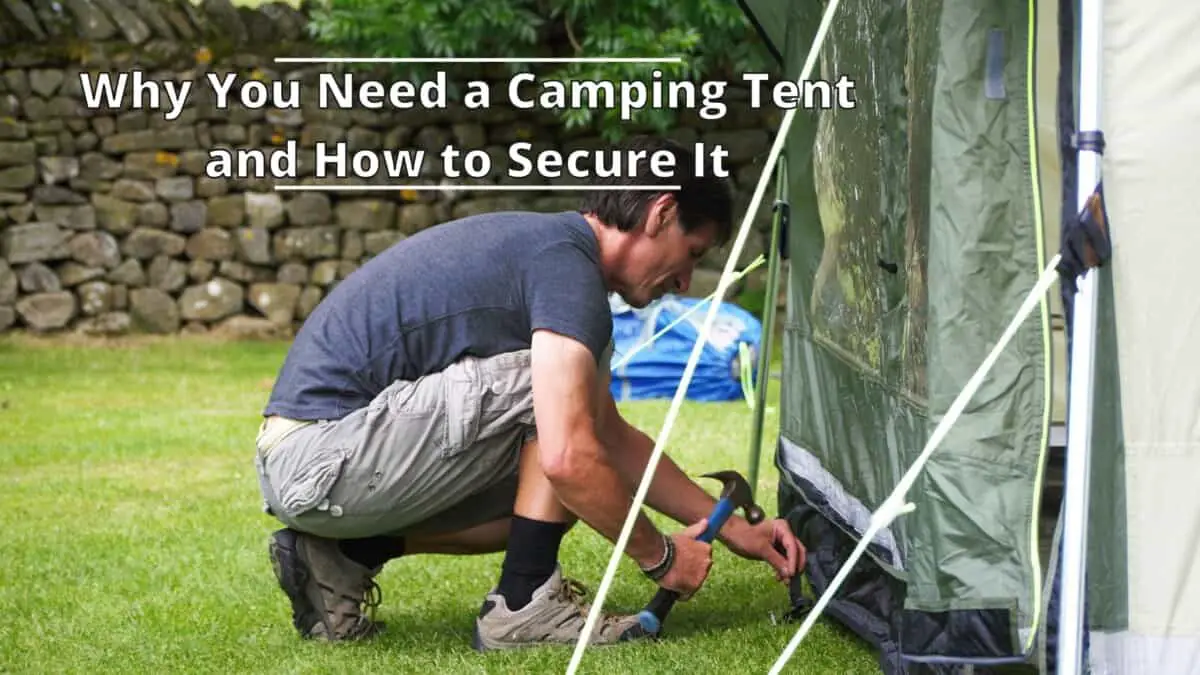Camping can unplug you from the stress of work or school. But before you can have that memorable adventure, you need to heed some warnings and tips. This will keep you from facing danger and losing your things.
It is important to have a tent to shelter yourself from any weather and outside elements. You also need to lock up your things and tent when camping. Observe regular maintenance to preserve your tent for future use.
In this article, we will provide tips and information on why a tent is important when camping, and ways to secure it. We will also discuss how to preserve it, and will share methods to waterproof your tent.
The heart of your campsite is your tent. No matter how comfortable your camp may be, if you do not have a good camping tent, your camping experience will not be as satisfactory as you want it to be. If you want to invest in a good tent, check out our article on the best tents for camping where we listed and reviewed the top tents available in the market today.
Why using a tent is important when camping
Using a tent when camping is important because it can protect you from the weather, ensure that you sleep well, prevent the intrusion of insects, provide privacy, and offer you a wonderful camping experience. It is an added advantage if you can stay longer and enjoy everything in the middle of the forest.
1. Protects you from the weather
Tents were created to substitute for the lack of shelter outside. A tent can protect you from either cold, windy, sunny, or rainy weather conditions. Some tents also contain unique features to meet your needs when camping, like Coleman’s Dark Room or waterproof capacities.
2. Provides sound sleep
Some people find it uncomfortable to rest in an open field because they feel vulnerable to any danger. Sleeping in a tent can make you feel secure, and provide you with a good night’s sleep. After a whole day of traveling, a hiker will surely need to rest appropriately.
3. Prevents insect bites
The mesh panels in a tent work as a shield to get rid of insects. Why mesh panels? They allow for proper ventilation, while preventing insects from entering your tent. Although you may think that you only need to avoid wild animals, you’ll want to be vigilant against poisonous insect bites.
4. Creates privacy
Having privacy—especially if you are camping with kids, friends, or other family members—is also important. You need personal space to do things, like change your clothes, for instance.
5. Ensures a great recreational experience
Most hikers and campers choose this kind of activity to unplug from stress, and recharge through the beauty of nature. Tents allow you to stay overnight, so that you can enjoy every moment.
Your tent is not the only necessary equipment that you need to bring when you’re going camping. There are a lot of important things that you need to bring and it can get a bit overwhelming. We listed all the camping items you’ll need for the great outdoors to help you make sure that you have everything that you need for your camping trip.
How lock your tent when camping?
It is recommended that you lock your tent when camping to avoid losing your things. You can lock your tent with a padlock, but you should also travel with people you trust, choose an ideal site, use a rainfly, avoid using a freestanding tent, and lock up your possessions and food.
1. Use a padlock
Even if you are in the middle of the woods, you cannot be sure that your equipment and valuables will remain safe and secure if you leave them alone. Therefore, it is advisable to lock your tent zippers with a padlock.
The only disadvantage is that other people might assume that a locked tent contains important stuff, so hide the locks if you can. Locks are applicable not only in this situation, but also when you are resting at night.
2. Go with trusted people
Camping with people you trust (e.g., family and friends) is another way to secure your tent. One of the best options is to have someone look out for your things if you want to travel around the area.
3. Choose an ideal camping site
If you choose a very secluded area, it may become prone to outside dangers. Don’t stay in places where something might attack you, or where you feel very alone. We suggest that, if possible, you stay at campgrounds.
4. Use a rainfly
This tent feature can be utilized to double your protection from outside dangers. If your tent has a rainfly, pack it, because it can shield you from the elements.
5. Lock up your essentials and food
When you leave your tent, take your most essential and costly valuables with you. If you are bringing your vehicle, leave those important items inside it instead of your tent. This way, you can avoid losing these items while camping.
Don’t leave your things outside the tent if you are sleeping at night, as you don’t know if there are thieves in the area. Instead, place your belongings inside the tent. Also, your food makes you vulnerable to animals, so to prevent them from attacking you, put your food somewhere far from the tent.
6. Avoid using a freestanding tent
This type of tents is easy to take down and is lightweight. Therefore, if you install it and then leave it, the tent can easily be stolen. To prevent this from happening, choose a tent that is compact, and has a robust installation process.
Investing in camping gear can be a nerve-racking experience. The items that you are about to purchase are not cheap, but with the right timing, you might be able to buy them at a lower price. What is the best time to buy camping gear? Read our article to learn more.
How do you preserve a tent?
There are several ways to preserve your tent, not only when you store it, but also to protect it every time you use it. The key methods to preserve your tent are to dry it, store it in a cool place, and protect it in rainy weather.
1. Dry your tent
Before storing your tent, you should check to see if it is wet or damp from the rain. One of the examples we can provide in this regard is an umbrella. If you store an umbrella without letting it dry it first, it will result in a foul odor, and may weaken the fabric. For tents, waterproofing materials are used, and if you don’t let your tent dry before storing it, the waterproofing feature can be weakened.
2. Keep your tent clean
Even if you are not going to use it, make it a habit to maintain and clean your tent regularly. Wash it with soap after camping, and make sure that the cleaning materials you use will not damage the fabric. Consult the manufacturer about this if you have any doubt.
3. Store it in a cool place
Avoid putting pressure on the poles of the tent. Loosen every feature to avoid breakage, so that it performs just as well every time you use it. Finally, choose a dry place to limit the presence of moisture.
4. Protect it from the rain
A tent is supposed to be your shield from the weather. But to make it more robust, you can use groundsheets and tarps for double protection. Install your tent where the roof can drain the water properly, and don’t forget to utilize gears that are tested and proven. Also, store your equipment using dry storage bags.
One of the first challenges that you will encounter when you go camping is setting up your tent. If you don’t want to go through the hassle and stress of this process, we recommend that you try a pop up tent. Read our article to learn more about how a pop up tent works.
Can you waterproof a tent?
Yes, you can waterproof, or even re-waterproof your tent. To do so, you can buy a waterproofing spray that you will use to coat the fabric of your tent. Before you proceed, read the directions below.
-
Do it in dry and warm weather
After purchasing your waterproof spray, be sure to apply it in sunny or dry weather. This can make the drying process quicker, and prevent rain from washing off the spray you just applied.
-
Choose the best material
Don’t apply elements that cannot be endured by your tent, because this can further damage the fabric instead of strengthening it.
-
Know the capacity of your tent
Maintaining knowledge about your tent can help you avoid damaging it. There are some waterproofing methods that you will carry out, either wet or dry.
-
Clean your tent
Remove dirt from your tent before applying the waterproofing spray.
-
Apply it slowly
For best results, be careful about how you apply the spray. The more carefully you apply it, the better the result.
-
Dry it
Similarly to paint, you should leave your tent to dry as much as possible to ensure that the waterproofing material sticks to your tent.
Conclusion
A camping tent is necessary to protect you from outside elements and to help you achieve total relaxation. Plus, with a tent, you can stay longer in isolated places without having to worry about having a roof over your head.
Always make sure to protect and secure your belongings while having fun. A tent is secure enough as long as you are nearby, but if you plan on going somewhere away from your camp, it’s better to take extra safety measures such as using locks and going with a group. By following these tips, you can have a memorable and safe camping experience.
Camping tents are not cheap, especially if you chose one that has a big capacity or extra features, which is why it is important to make sure that you are using your tent properly. As we have discussed, there are a few things that you can do to ensure the longevity of your equipment. As long as you follow our tips, you’ll be able to use your tent for many years to come.

